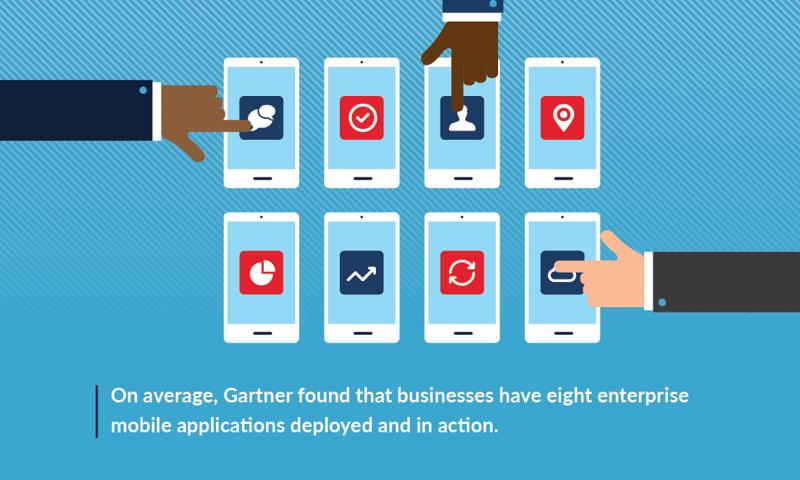Mobile development is emerging as a critical need, but also major roadblock, in the enterprise world. Businesses face mounting pressure to create intuitive, user-friendly apps that bring consumer-like functionality to the workplace. However, the need to figure out how to develop for different devices and operating systems is combining with demand for a large volume of apps to overwhelm many IT teams.

"While businesses are more reliant on enterprise apps, they aren't getting better at creating them."
A Growing Reliance on Enterprise Apps
The app creation problem is becoming acute as businesses ramp up their dependence on mobile apps. MarketsandMarkets found that the global enterprise app market will expand at a compound annual growth rate of more than 15 percent for the 2016 through 2021 period. When 2021 rolls around, the enterprise mobile app market will be valued at $98.03 billion. While businesses are becoming more reliant on enterprise apps, they aren't getting better at creating them.
A study from Gartner found that:
- More than 25 percent of organizations have yet to build, customize, or virtualize mobile apps within the past year. It is worth noting that this represents a global survey base, so the statistics should be considered relative to the varied economic conditions around the world
- Last year, 39 percent of companies had not built, customized, or virtualized a mobile app in the previous 12 months
- IT teams tend to have a large backlog of app work that they need to complete, Adrian Leow, research Director for Gartner explained
- Leow said that the way IT teams are trying to play catch up is creating a breeding ground for shadow IT
- It is time for businesses to start prioritizing mobile app development and getting control over their environments, Leow said
 Keeping up with app demands can put a burden on any IT team.
Keeping up with app demands can put a burden on any IT team.While mobile development challenges are the norm, businesses are becoming extremely dependent on the technology. On average, Gartner found that businesses have:
- Eight enterprise mobile applications deployed and in action
- Between two and three mobile apps in development
- At least six apps planned for the next year, but not being developed at the time of the survey
Businesses are moving quickly to embrace mobile, something that MarketsandMarkets explained is happening because organizations are realizing they need to establish a technology framework that lets them build out mobile-ready business process frameworks. Creating apps that are robust enough to align with everyday operational needs is critical, a point that Gartner's Leow highlights by pointing out that many businesses are struggling enough with mobile development that they are cutting corners in creating solutions.
"It's encouraging to see significant growth in the number of mobile apps that are planned, but most of this growth is in mobile web apps as opposed to native or hybrid mobile apps," said Leow. "This indicates that some enterprises may be frustrated with developing mobile apps and are instead refocusing on responsive websites to address their mobile needs."
Gartner found that businesses lack the resources to create the mobile apps they need. Funding, work availability, and skills gaps are coming together to undermine mobile development.
These are all problems that can be solved with low-code platforms, as the technology simplifies development and creates a strong framework for rapid app creation and deployment.
Using Low-Code Platforms to Transform Mobile Development
There are exceedingly good reasons why mobile development is difficult in the enterprise. Device and operating system diversity are only the touchpoints. The need to create secure data workflows to protect information traveling through complex networks puts incredible pressure on developers. Features such as encryption and robust user authentication are even more important in mobile apps than traditional desktop-based systems. Varied interface types force organizations to rethink their typical interface design parameters around the mobile experience.
These factors all come together to force enterprise developers to go back to the drawing board when they consider how they create apps. In essence, organizations must look to the consumer world for app inspiration and rethink the traditional rules governing enterprise apps. Low-code tools counter many of these challenges through dedicated application development platforms that create a set framework for the app to exist within.
In a low-code environment:
- The platform itself is optimized and updated to work natively on different devices and operating systems
- Apps are designed and developed to run within the platform, creating a much simpler and more stable environment.
- Visual interfaces are used to drag and drop interface items and similar app elements
- Modular development tools minimize the code that needs to be written and allow non-tech users to create apps
- Built-in process management systems allow users to align app functionality directly with business needs
- IT teams can create rules and establish governance over all apps existing within the platform, ensuring best practices don't slip through the cracks
- Custom code can be built on to low-code apps as needed, creating flexibility for IT teams that want to blend development styles
The mobile-first enterprise world depends on tools that alleviate the development burden on IT teams. However, this focus on the IT side of the equation also sets a foundation for benefits that extend across the business.
 Shifting device use patters are changing enterprise IT demands.
Shifting device use patters are changing enterprise IT demands.The Low-Code Trickle Down Effect
Imagine a business that is struggling to keep up with everyday IT demands. In all likelihood, that organizations is also using legacy processes and procedures that force workers to jump through hoops to meet customer needs and adapt to shifting marketplace demands. Using low-code platforms to empower the IT team changes this dynamic by creating a more flexible, scalable development environment.
With a more robust, diversified development ecosystem in place, organizations can constantly tweak their apps and services to better coordinate with operational requirements. This ensures that processes and technological capabilities consistently align, giving users the tools they need to engage customers in the most efficient way possible. Better IT operations extend to a better work environment across multiple lines of business which, in turn, trickles down to improved customer experiences.
Mobile devices have been disrupting the economy for years, and businesses are still playing catch-up to new development demands and consumer-driven challenges. Improving backend IT capabilities through low-code platforms sets a foundation for sustainable innovation and helps businesses quickly make up any ground they may have lost as they try to transform around the demands of a digital world.
Appian provides process automation technology. We automate complex processes in large enterprises and governments. Our platform is known for its unique reliability and scale. We’ve been automating processes for 25 years and understand enterprise operations like no one else.
- Gartner® Magic Quadrant™ for Business Orchestration and Automation Technologies
- Gartner® Low-Code Magic Quadrant™ 2025
- Gartner® Quick Answer: Beyond RPA, BPA, and Low Code - The Future is BOAT
- Gartner® Innovation Insight for the AI Agent Platform Landscape
- 2025 Forrester Wave™: Digital Process Automation Software
- Everest Group PEAK Matrix® - Process Orchestration 2024
- Appian named a leader in the 2025 Gartner Magic Quadrant for Enterprise Low-Code Application Platforms
- Appian Ranked by Gartner #1 for Business Workflow Automation with Integration Use Case in Low-Code Report
- AON Transforms Reinsurance Claims Processing with Appian
- Appian AI Copilot Delivers Practical Value to Boost Developer Productivity
- Appian Awarded $2.036 Billion in Lawsuit Against Pegasystems
- Generative AI vs LLMs: What's the Difference?
- What are AI Agents, and How to Use Them in Processes?
- AI Workflow Automation: See How it Works
- KYC Process: The Complete Guide
- How Does AI Model Training Work?
- Generative AI For Insurance
- Data Fabric's 5 Key Benefits
- What is a Continuous Improvement Process & How to Implement It

